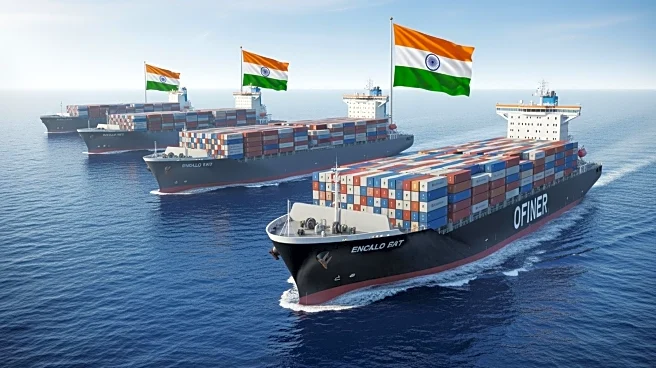What's Happening?
The MSC Mediterranean Shipping Company is reportedly considering reflagging several of its vessels under the Indian flag. This decision aligns with India's strategic initiative to expand its national shipping capacity and reduce reliance on foreign-flagged
carriers. The Indian government has been actively engaging with major shipping companies, including MSC, CMA CGM, and Maersk, to bolster its domestic shipping industry. The move to reflag vessels in India is partly driven by regulatory changes that offer a five-to-ten-year life extension for vessels registered under the Indian flag. This initiative is part of a broader maritime development strategy spearheaded by Prime Minister Narendra Modi, aiming to enhance India's shipbuilding capabilities and support domestic carriers.
Why It's Important?
Reflagging vessels to India could significantly impact the global shipping industry by shifting some operations to Indian ports and shipyards. This move is expected to provide economic advantages to companies like MSC, as India reforms its shipping policies. The initiative also supports India's goal of becoming a major player in the global shipping market, potentially reducing costs and increasing efficiency for shipping companies. Additionally, this development could lead to increased employment opportunities for Indian seafarers and boost the country's shipbuilding industry. However, it also highlights the competitive pressures on foreign carriers to adapt to India's evolving regulatory landscape.
What's Next?
As MSC and other shipping companies consider reflagging their vessels to India, further regulatory changes are anticipated. India may tighten its cabotage regulations, affecting intra-India transport, and impose stricter controls on vessel-sharing agreements. These changes could influence the operational strategies of international shipping companies operating in the region. Additionally, the ongoing legal disputes between MSC and the Kerala State over compensation claims related to the MSC Elsa 3 incident may impact MSC's decision-making process. The outcome of these legal proceedings could affect MSC's relationship with Indian authorities and its future operations in the country.
Beyond the Headlines
The reflagging of vessels to India could have broader implications for international maritime law and trade practices. It may prompt other countries to reconsider their shipping regulations and strategies to attract foreign carriers. This development also raises questions about the environmental and safety standards of reflagged vessels, as India seeks to modernize its fleet and improve its maritime infrastructure. The move could set a precedent for other emerging economies looking to enhance their shipping industries and reduce dependency on foreign carriers.
















